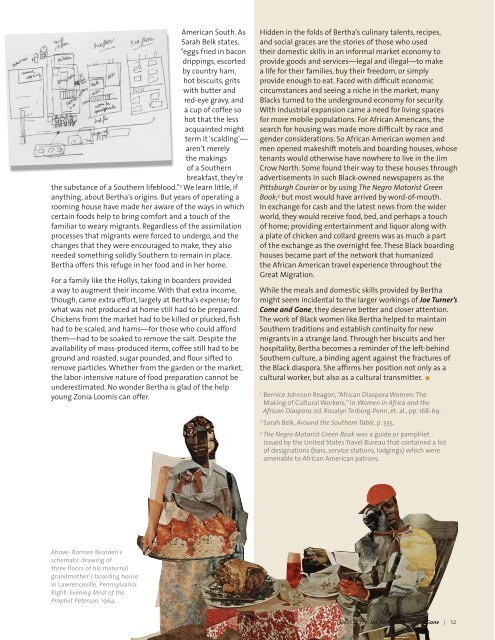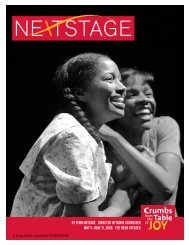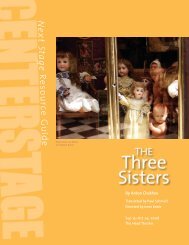Joe turner's Come and Gone - Center Stage
Joe turner's Come and Gone - Center Stage
Joe turner's Come and Gone - Center Stage
You also want an ePaper? Increase the reach of your titles
YUMPU automatically turns print PDFs into web optimized ePapers that Google loves.
American South. As<br />
Sarah Belk states,<br />
“eggs fried in bacon<br />
drippings, escorted<br />
by country ham,<br />
hot biscuits, grits<br />
with butter <strong>and</strong><br />
red-eye gravy, <strong>and</strong><br />
a cup of coffee so<br />
hot that the less<br />
acquainted might<br />
term it ‘scalding’—<br />
aren’t merely<br />
the makings<br />
of a Southern<br />
breakfast, they’re<br />
the substance of a Southern lifeblood.” 2 We learn little, if<br />
anything, about Bertha’s origins. But years of operating a<br />
rooming house have made her aware of the ways in which<br />
certain foods help to bring comfort <strong>and</strong> a touch of the<br />
familiar to weary migrants. Regardless of the assimilation<br />
processes that migrants were forced to undergo, <strong>and</strong> the<br />
changes that they were encouraged to make, they also<br />
needed something solidly Southern to remain in place.<br />
Bertha offers this refuge in her food <strong>and</strong> in her home.<br />
For a family like the Hollys, taking in boarders provided<br />
a way to augment their income. With that extra income,<br />
though, came extra effort, largely at Bertha’s expense; for<br />
what was not produced at home still had to be prepared.<br />
Chickens from the market had to be killed or plucked, fish<br />
had to be scaled, <strong>and</strong> hams—for those who could afford<br />
them—had to be soaked to remove the salt. Despite the<br />
availability of mass-produced items, coffee still had to be<br />
ground <strong>and</strong> roasted, sugar pounded, <strong>and</strong> flour sifted to<br />
remove particles. Whether from the garden or the market,<br />
the labor-intensive nature of food preparation cannot be<br />
underestimated. No wonder Bertha is glad of the help<br />
young Zonia Loomis can offer.<br />
Hidden in the folds of Bertha’s culinary talents, recipes,<br />
<strong>and</strong> social graces are the stories of those who used<br />
their domestic skills in an informal market economy to<br />
provide goods <strong>and</strong> services—legal <strong>and</strong> illegal—to make<br />
a life for their families, buy their freedom, or simply<br />
provide enough to eat. Faced with difficult economic<br />
circumstances <strong>and</strong> seeing a niche in the market, many<br />
Blacks turned to the underground economy for security.<br />
With industrial expansion came a need for living spaces<br />
for more mobile populations. For African Americans, the<br />
search for housing was made more difficult by race <strong>and</strong><br />
gender considerations. So African American women <strong>and</strong><br />
men opened makeshift motels <strong>and</strong> boarding houses, whose<br />
tenants would otherwise have nowhere to live in the Jim<br />
Crow North. Some found their way to these houses through<br />
advertisements in such Black-owned newspapers as the<br />
Pittsburgh Courier or by using The Negro Motorist Green<br />
Book; 3 but most would have arrived by word-of-mouth.<br />
In exchange for cash <strong>and</strong> the latest news from the wider<br />
world, they would receive food, bed, <strong>and</strong> perhaps a touch<br />
of home; providing entertainment <strong>and</strong> liquor along with<br />
a plate of chicken <strong>and</strong> collard greens was as much a part<br />
of the exchange as the overnight fee. These Black boarding<br />
houses became part of the network that humanized<br />
the African American travel experience throughout the<br />
Great Migration.<br />
While the meals <strong>and</strong> domestic skills provided by Bertha<br />
might seem incidental to the larger workings of <strong>Joe</strong> Turner’s<br />
<strong>Come</strong> <strong>and</strong> <strong>Gone</strong>, they deserve better <strong>and</strong> closer attention.<br />
The work of Black women like Bertha helped to maintain<br />
Southern traditions <strong>and</strong> establish continuity for new<br />
migrants in a strange l<strong>and</strong>. Through her biscuits <strong>and</strong> her<br />
hospitality, Bertha becomes a reminder of the left-behind<br />
Southern culture, a binding agent against the fractures of<br />
the Black diaspora. She affirms her position not only as a<br />
cultural worker, but also as a cultural transmitter.•<br />
1<br />
Bernice Johnson Reagon, “African Diaspora Women: The<br />
Making of Cultural Workers,” in Women in Africa <strong>and</strong> the<br />
African Diaspora, ed. Rosalyn Terborg-Penn, et. al., pp. 168-69.<br />
2<br />
Sarah Belk, Around the Southern Table, p. 335.<br />
3<br />
The Negro Motorist Green Book was a guide or pamphlet<br />
issued by the United States Travel Bureau that contained a list<br />
of designations (bars, service stations, lodgings) which were<br />
amenable to African American patrons.<br />
Above: Romare Bearden’s<br />
schematic drawing of<br />
three floors of his maternal<br />
gr<strong>and</strong>mother’s boarding house<br />
in Lawrenceville, Pennsylvania.<br />
Right: Evening Meal of the<br />
Prophet Peterson, 1964.<br />
Next <strong>Stage</strong>: <strong>Joe</strong> Turner’s <strong>Come</strong> <strong>and</strong> <strong>Gone</strong> | 12









